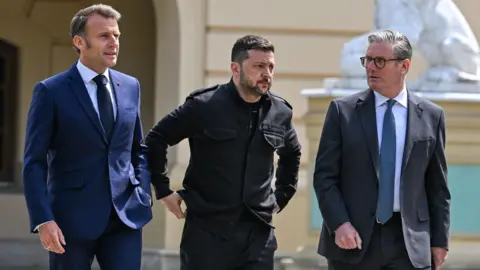European nations are demonstrating unwavering support for Ukraine amidst ongoing geopolitical tensions, particularly in light of the war initiated by Russia. Recently, key allies, including leaders from the United Kingdom, France, Italy, Germany, Poland, Finland, and representatives from the European Commission, have come together to emphasize that any peace discussions with Russia must involve Ukraine. A united statement underscored that the resolution of the conflict cannot proceed without the active participation of the Ukrainian government.
This joint declaration follows an announcement from U.S. President Donald Trump regarding plans to meet Russian President Vladimir Putin in Alaska, signaling a potential shift in dialogue aimed at ending the conflict. However, concerns are rife that Ukraine, despite being a critical player, might be sidelined in negotiations that directly affect its sovereignty and territorial integrity. President Volodymyr Zelensky has expressed his fears that any agreements reached without Ukrainian involvement would be tantamount to “dead decisions,” reflecting the deep commitment of Kyiv to a diplomatic solution.
The urgency of these conversations has been further amplified by discussions from the White House, where a spokesperson indicated President Trump might still seek to engage both Zelensky and Putin in a trilateral meeting. However, the practicality of such a discussion remains uncertain, particularly since Russian President Putin has previously declined opportunities for direct talks with Zelensky. It’s worth noting that the last significant face-to-face meeting occurred over three years ago, shortly before the invasion of Ukraine.
President Trump has also suggested that negotiations might involve “swapping of territories,” a notion that has ignited strong opposition from the Ukrainian leadership. Zelensky firmly dismissed the idea of conceding any territories in exchange for peace, asserting that Ukraine would not reward Russia for its aggressive actions. He emphasized that any unilateral decisions made without Ukraine’s consent would ultimately undermine the prospects for peace.
Reports from CBS, in collaboration with BBC, have indicated that the U.S. is encouraging European partners to consider an agreement where Russia could retain control over disputed areas like the Donbas in eastern Ukraine and the Crimean Peninsula. However, in their unified statement, European leaders have been resolute in rejecting the idea that “international borders must not be changed by force.” This stands as a clear indication of their commitment to upholding Ukraine’s autonomy and right to self-determination.
Adding to this climate, European leaders reiterated the necessity for a diplomatic solution not only for Ukraine’s recovery but also for the broader security landscape across Europe, stating the importance of European involvement in the dialogue concerning future agreements. French President Emmanuel Macron has publicly emphasized that the security interests of European states are intimately tied to the resolution of this conflict. In a recent exchange with Zelensky, Macron asked for a unified approach to ensure that Russia cannot manipulate the situation further.
On the diplomatic front, U.S. Vice-President JD Vance has stepped into the role of mediating discussions with European allies and Ukrainian officials, underlining the critical need for Ukraine to be represented in the peace negotiations. Andriy Yermak, a senior aide to President Zelensky, forcefully stated that a genuine, sustainable peace could only be attained with Ukraine actively engaged at the negotiating table.
As the world watches the unfolding situations in Ukraine, the upcoming meeting between Trump and Putin keeps everyone on edge. It has been nearly two years since the two leaders last met, May 2021 in Geneva, before the escalation of hostilities. The complexity of the situation has led to dire consequences, with Russian forces taking significant portions of eastern Ukraine amid continuing diplomatic efforts to reach a resolution.
In summary, the position of European allies remains unwavering: Ukraine’s involvement in peace negotiations is non-negotiable. They continue to advocate for a solution that honors Ukraine’s plight and rights while simultaneously addressing the broader European security concerns tied to the ongoing conflict. President Zelensky’s staunch position against any discussion of territory swaps highlights that peace cannot be achieved without recognizing the sovereignty and choices of Ukraine, therein ensuring that the seeds of a genuine resolution are planted for future security in the region.











